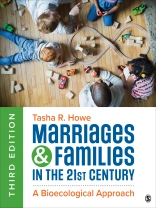In Marriages and Families in the Twenty-First Century: A Bioecological Approach, Tasha R. Howe′s unique micro-to-macro perspective invites all readers to explore the full complexity of contemporary relationships and family structures within their ever-changing social, cultural, psychological, and biological frameworks. The illuminating narrative leads students into the future of the field by uniting the latest developmental science with everyday examples that place the individual within the context of family, peers, neighbors, teachers, schools, media, religious institutions, and culture. The Third Edition encourages students to analyze and apply the material with abundant self-reflection exercises, self-assessments, case studies, and critical-thinking questions, providing them with a firm grasp of the research as well as concrete tools to use in their own lives, relationships, and careers.
Inhaltsverzeichnis
Chapter 1: The Changing American Family
The Standard North American Family
Family Structures Versus Family Processes
Native American and European Families
Many American Histories
Chapter 2: How We Study the Family: Theories and Research Methods
Theories Influenced by Communist Ideologies
Theories Influenced by Scientific Advances
Experimental Research Methods
Correlational Research Methods
Demographic Variables in Research Methods
Chapter 3: Sex and Gender
What’s the Difference Between Sex, Gender, and Sexual Orientation?
The Importance of Gender for Living in Families
Theories and Research on Gender Role Development
Genetic and Biological Influences on Gender: Prenatal to Puberty
Diversity in Adult Gender Roles
Chapter 4: Sexualities
Macrosystem and Chronosystem Influences on Sexuality
How Our Sex Organs Work
Sexual Orientation
Contemporary Issues in Sexuality
Chapter 5: Dating and Mate Selection
Changing Trends in Courtship, Dating, Hooking Up, and Mate Selection
A Bioecological Examination of Dating and Mate Selection
Theories of Dating and Mate Selection
Diversity in Dating and Mate Selection
Contemporary Trends Around the World
Chapter 6: Love
What Is Love?
Is Love Universal?
Biological Aspects of Love
The Social Contexts of Love
Chapter 7: Marriages and Committed Partnerships
Historical and Contemporary Trends in Marriage
Health Benefits of Happy Marriages
Cohabitation, Covenant, and Arranged Marriages
Same-Sex Marriages
Interracial and Intercultural Marriages
Marital Problems and Building Healthy Relationships
Chapter 8: Living Single
The Normative Life Cycle Model: Effects on Singles
Macrosystem Forces Against Singlehood
The Diverse Lives of Single People
The Psychological and Physical Health of Single People
Chapter 9: Reproduction and Parenting
Historical and Cultural Trends in Parenting
Reproduction and Other Ways to Have Children
The Transition to Parenting: Roles and Responsibilities
The Many Faces of Parenthood
Chapter 10: The Economy of Working Families: Balancing Mental, Physical, and Financial Health in the 21st Century
Contemporary and Historic Trends in Family Economies
Working Women
Diverse Experiences in Work and Family Life
Balancing Work and Family
Poverty and Wealth: Living on the Economic Extremes
Chapter 11: Families in Crisis: Violence, Abuse, and Neglect
A Bioecological Framework for Understanding the Pervasiveness of Violence
Intimate Partner Violence
Batterers
Child Maltreatment
Chapter 12: Divorce and Remarriage
Trends in Divorce and Remarriage Over Time
The Effects of Divorce
The Complexities of Divorce
Remarriage
Chapter 13: Growing Older in Families
Historical and Cultural Beliefs About Aging
Multidimensional Changes With Age
Well-Being After Retirement
Intergenerational Family Relationships
Chapter 14: The Evolution of Families in the 21st Century
Five Key Ideas for Understanding Marriages and Families
General Trends in Multiculturalism
How Gender Equality and LGBT Rights Impact Global Well-Being
Globalization
An In-Depth Look at Immigration
Glossary
References
Index
About the Author
Über den Autor
Tasha R. Howe, Ph D, is a developmental psychologist and Professor of Psychology Cal Poly Humboldt. She specializes in developmental psychopathology, parent–child relationships, and family violence prevention. Dr. Howe teaches a wide variety of undergraduate and graduate courses in topics such as human development, family relations in contemporary society, and family violence. She is a master international trainer for the American Psychological Association’s parenting program, ACT Raising Safe Kids, and has published empirical evaluations of this program. She has worked globally on child welfare issues, training social workers and other professionals on the skills of early violence prevention and evidence-based interventions with children and families. She emphasizes neurodevelopmental approaches to assessment and treatment of childhood psychopathology and mindfulness-based programming. Dr. Howe has also taught university courses internationally, particularly in her role as a two-time Fulbright Scholar to Cyprus (2008) and Croatia (2014). She was also a Fulbright Specialist to the Russian Federation (2017) and to Colombia (2022), presenting on diverse topics such as academic freedom, community-based research, the American higher education system, and working with Indigenous populations.












